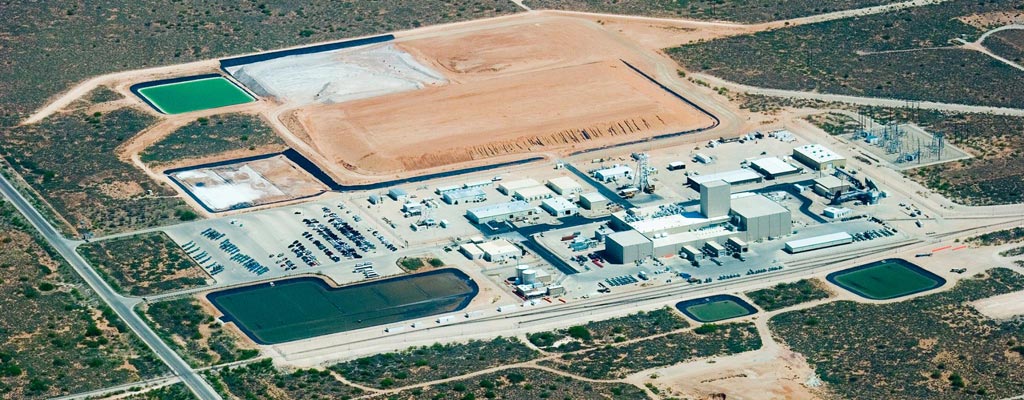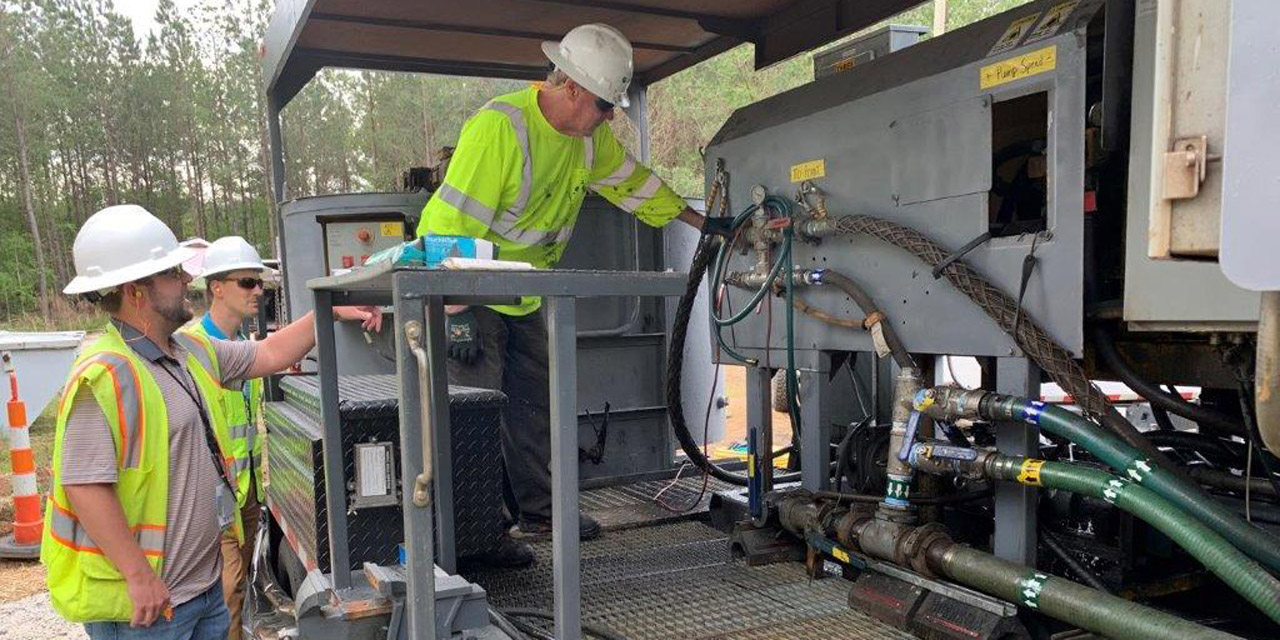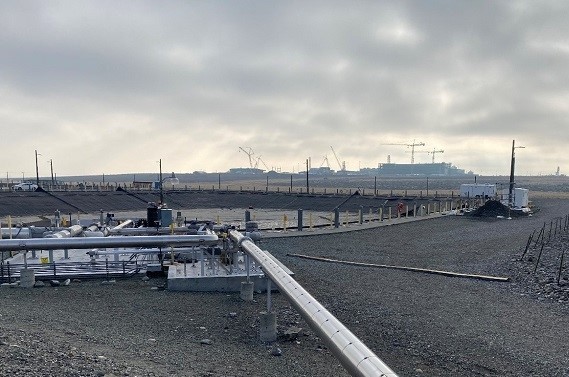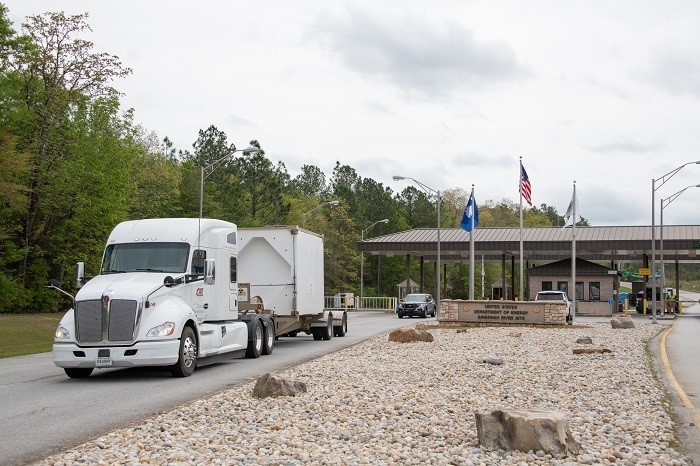The Waste Isolation Pilot Plant in southeastern New Mexico.
Reston, Va.-based Tularosa Basin Range Services (TBRS), a single-purpose entity under the umbrella of Bechtel National, has been awarded the 10-year, $3 billion management and operating contract for the Waste Isolation Pilot Plant (WIPP) by the Department of Energy’s Office of Environmental Management (EM). Located near Carlsbad, N.M., WIPP is the DOE’s geologic repository for defense-generated transuranic waste.
The new contract replaces the current WIPP M&O contract held by Nuclear Waste Partnership, which expires on September 30. The contract with TBRS was announced on July 11.
An aerial view of Hanford’s Waste Treatment and Immobilization Plant in 2021. (Photo: Bechtel National)
The U.S. Supreme Court on June 21 struck down a Washington state workers’ compensation law that was designed to make it easier for workers at the Department of Energy’s Hanford Site to receive compensation benefits. The court, by unanimous decision, found that the law violates the U.S. Supremacy Clause and discriminates against the federal government and its contractors.
Located near Richland, Wash., the Hanford Site produced plutonium for the U.S. weapons program for more than 40 years and is currently undergoing a massive radiological cleanup mission involving around 10,000 workers.
A CAST Specialty Transportation truck loaded with TRUPACT-II shipping containers at WIPP. (Photo: DOE)
The Department of Energy’s Office of Environmental Management (EM) has awarded CAST Specialty Transportation a contract to provide transportation services for the Waste Isolation Pilot Plant, the DOE’s repository for defense-generated transuranic (TRU) waste near Carlsbad, N.M.
Myrna Simpson conducts molecular biogeochemistry research at the University of Toronto Scarborough. (Photo: Ken Jones/University of Toronto)
Researchers at three Canadian universities are studying whether bentonite clay—used as an engineered barrier in Canada’s proposed deep geological repository—can support sulfide-producing microbes that can eat away at the canisters containing spent nuclear fuel.
A modified forklift with a customized handling attachment is used to move spent fuel containers and their heavy bentonite clay housings. It can move autonomously or be manually operated remotely from outside the room, as needed. (Photo: NWMO)
Canada’s Nuclear Waste Management Organization (NWMO) has announced that it has successfully completed a full-scale demonstration of the engineered barriers that are designed to contain and isolate Canada’s spent nuclear fuel in a deep geological repository.
SRNS environmental engineers Bryce Garner (left) and Adam Willey (center) ask questions of lead operator Daniel Ferrell (right), from field services contractor Cascade Environmental, as he describes how equipment injects oil and iron into the Savannah River Site’s groundwater. (Photo: DOE)
In this week’s “EM Update,” the Department of Energy’s Office of Environmental Management (EM) reports that its contractor Savannah River Nuclear Solutions (SRNS) has successfully reduced degreasing solvents in the aquifer beneath the Savannah River Site in South Carolina using a technology that injects a form of iron and oil into groundwater.
“The oil attracts the Cold War[–era] cleaning solvents while the iron degrades and neutralizes the contamination,” said Shannan Lucero, SRNS manager for area closure projects.
SeAH Besteel’s Gusan plant in South Korea. (Image: SeAH Besteel)
Orano TN Americas and South Korean special steel maker SeAH Besteel last week announced the completion and delivery of the first dual-purpose used nuclear fuel dry storage cask manufactured for a U.S. utility by the Korean company.
Following Orano’s purchase order in September 2019, SeAH Besteel established a mass production system for Orano’s dual-purpose casks in compliance with U.S. and international nuclear standards. Orano TN Americas is a subsidiary of France’s Orano NPS.
During the Hanford Site's Direct-Feed Low-Activity Waste Program treatment operations, the Waste Treatment and Immobilization Plant, background, will feed liquid waste to the Liquid Effluent Retention Facility, foreground, through a primary transfer line pictured here. (Photo: DOE)
Work crews at the Department of Energy's Hanford Site recently completed the first transfer of test water from the Waste Treatment and Immobilization Plant's Effluent Management Facility to the nearby Liquid Effluent Retention Facility (LERF). The transfer of 6,000 gallons was the first simulation of the process that will be used to treat secondary liquid waste from the plant’s Low-Activity Waste Facility during operations to treat tank waste.
“This is a tremendous accomplishment that culminates years of work by our team and alumni toward being ready for hot commissioning,” said Valerie McCain, project director and senior vice president for Bechtel National, Inc. “It’s an important step for the entire Hanford team and our collective mission of protecting the Columbia River and its shoreline communities.”
Bechtel National is a contractor of the DOE's Office of Environmental Management's Office of River Protection.
The final legacy TRU waste shipment from Savannah River Site departs the site in mid-April, on its way to WIPP in southeastern New Mexico for permanent disposal. (Photo: DOE)
The Department of Energy reported this month that the final container of legacy transuranic waste from the Savannah River Site arrived at the Waste Isolation Pilot Plant for permanent disposal on the afternoon of April 14. The shipment capped the end of a journey for 239 shipments that began in 2011.
In all, trucks that carried the shipments weighed a combined 11,402,000 pounds and travelled more than 347,000 miles to the WIPP site.
Denmark’s Risø National Laboratory for Sustainable Energy. The two cylindrical buildings outermost on the peninsula contained the two nuclear reactors DR-2 and DR-3. (Photo: DTU)
An independent review of Denmark’s radioactive waste management program by an International Atomic Energy Agency team found that the country has developed a robust and well-functioning system, but that the national program needs further refinement if it is to be effectively implemented.
The government of Denmark requested the review of its waste management program to fulfil its European Union obligations requiring an independent review of EU member states’ national radioactive waste management programs. The Danish parliament adopted a resolution outlining the policy goals and activities of its national program for safely managing radioactive waste and spent nuclear fuel in 2018.
An NWMO geoscientist examines core samples pulled from rock in South Bruce, Ontario, as part of investigations of a potential deep geological repository. (Photo: NWMO)
Canada’s Nuclear Waste Management Organization (NWMO) has completed a deep borehole drilling program at the two sites in Ontario under investigation for potentially hosting a deep geological repository to hold the country’s spent nuclear fuel. The NWMO said that Canada’s top geoscientists are leading the studies, in which approximately eight kilometers of core samples were pulled from the bedrock in the Wabigoon-Ignace area and the Saugeen Ojibway Nation (SON)–South Bruce area.
The Department of Energy's Waste Isolation Pilot Plant, in New Mexico. (Photo: DOE)
The Waste Isolation Pilot Plant’s Emergency Operations Center (EOC) and Joint Information Center (JIC) were activated on April 9 following an abnormal event that occurred during routine waste handling at the Department of Energy’s WIPP repository for transuranic waste, near Carlsbad, N.M.
An NRC diagram of a LLW waste disposal site.
The Nuclear Regulatory Commission will integrate two separate rulemaking activities concerning the disposal of low-level radioactive waste, issuing a “re-proposed” rule that consolidates updates to 10 CFR Part 61, “Low-Level Radioactive Waste Disposal,” and proposed changes to the requirements for the near-surface disposal of greater-than-Class C (GTCC) waste.
Waste packages are loaded with contaminated soil during remediation work at Lawrence Berkeley National Laboratory. (Photo: PermaFix)
Depending on the size and complexity of a decommissioning project, the transportation and disposal of radioactive waste will have an oversized impact on planning, schedule, and budget. The scope of decommissioning a site contaminated with radioactive material begins and ends with the proper and safe packaging of waste and subsequent transportation from the site to the final disposal location. Once all of the waste is gone from the site, the compliance exercise can be completed and the site released from controls (i.e., the radioactive materials license is terminated and the site is decommissioned).

















